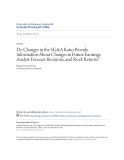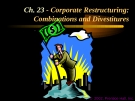
Costs to sales
-
Why Globalize? expand sales when domestic markets are saturated, should go overseas to increase sales and profits acquire resources resources may be more readily available and less costly in other countries diversify sources of sales and supplies different business cycles between countries may avoid impact of price swings or shortages avoid tariffs
 21p
21p  mioangelo1911
mioangelo1911
 17-03-2013
17-03-2013
 63
63
 6
6
 Download
Download
-
This study contributes to the stream of literature on fundamental analysis and SG&A costs by performing a more detailed breakdown of changes in the SG&A ratio and by demonstrating that this partitioning provides information about changes in future earnings, analyst forecast revisions, and future stock returns.
 99p
99p  fugu897
fugu897
 03-07-2019
03-07-2019
 23
23
 3
3
 Download
Download
-
This research investigates the current white spaces of green marketing and country of origin effects, where new research could contribute theoretical value. The conducted research examines American and Swedish consumers’ environmental awareness, willingness and initiative in contributing to their societies for future sustainability. Using a sample of 118 consumers from an intermediated questionnaire for the offline market, a conceptual framework was developed where the study created the foundation and reasonable support for the purposed framework.
 0p
0p  nguyenyenyn117
nguyenyenyn117
 18-06-2019
18-06-2019
 41
41
 6
6
 Download
Download
-
• Economies of Scale ex: reduce administrative expenses as a percentage of sales. • Tax Benefits ex: target firm has tax credits from operating losses, and lacks the income to use the credits. • Unused Debt Potential ex: merging with a firm that has little debt increases debt capacity.
 11p
11p  huynhcongdanh
huynhcongdanh
 12-06-2012
12-06-2012
 118
118
 24
24
 Download
Download
CHỦ ĐỀ BẠN MUỐN TÌM

















